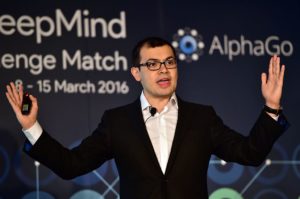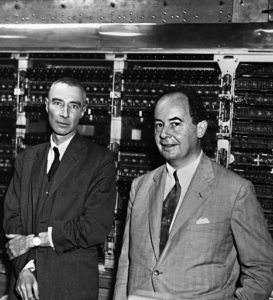The one thing everyone knows about J. Robert Oppenheimer, the man who led the Manhattan Project, was that as the blast of the first atomic test faded away in the desert of New Mexico, he said solemnly: “Now, I am become Death, the destroyer of worlds.”
It’s not true. Oppenheimer never even claimed to have said it. He said that, as the glow faded and the shockwave passed, “a few people laughed, a few people cried, most people were silent”, but that he “remembered the line from the Hindu scripture, the Bhagavad Gita … ‘Now, I am become Death, the destroyer of worlds.’” He did not say it out loud.
What he did say out loud may have been more prosaic. His brother Frank was there, and reported that Oppenheimer simply said: “It worked.”
Christopher Nolan has described Oppenheimer, the subject of his latest film, as “the most important man who ever lived”. The brilliant physicist directed the project that, for the first time, made humanity capable of destroying itself. But it is, frankly, remarkable that he was ever appointed.
The Manhattan Project was perhaps the greatest weapons project in history. At its peak, it employed 125,000 people; half a million people worked on it at one point or another. It spent $2.2 billion, equivalent to somewhere between $30 billion and $50 billion today — six or 10 times the cost of the Large Hadron Collider. It was conducted in utmost secrecy: the German, Japanese and Soviet governments all knew that the US or Britain were themselves conducting nuclear research, as they all were, to a greater or lesser degree — the theoretical possibility had been known for years, and nuclear fission was discovered in Berlin.
It’s surprising, then, that the job of project director was given to Oppenheimer, a psychologically troubled, communist-sympathising attempted murderer with little managerial experience and an abrasive interpersonal style. And yet it was and he was brilliant. As a result of his genius and aptitude, the Manhattan Project was a huge success, not just at its stated goal but in driving fundamental science forward vast leaps in a very short time.
Could that happen today? Would we want it to? What if we were to spend $30 and $50 billion on something similar? The trouble is, we’re sceptical of genius, now. The “great man theory of history” is a phrase used dismissively. Consider the derision when Dominic Cummings called for “super-talented weirdos” to join the government. And even if Oppenheimer was a genius — which he was, and built a team of geniuses around him — someone of a comparable background would surely get nowhere near the top of any major government project.
Look at the evidence. Oppenheimer was, if not a card-carrying communist, very close to one. He described himself as a “fellow traveller”, and, on the security questionnaire he filled out to join the Manhattan Project, wrote that he had been “a member of just about every Communist Front organisation on the West Coast”.
Later he would say that was a jokey overstatement, but his communist links were deep. His parents were German-Jewish immigrants to New York who had abandoned their faith but kept their cultural identity, joining a secular group called the Ethical Culture Society, whose founder was inspired by Marx. Oppenheimer’s first great relationship was with Jean Tatlock, a Communist Party member; his wife, Kitty Puening, was another communist. The Berkeley Radiation Laboratory where he worked as a young physicist was a hotbed of radical Leftist thought (it was known as the Rad Lab). A friend of his, Haakon Chevalier, had links to Soviet intelligence and may have even attempted to recruit Oppenheimer as a source. Imagine someone now, under investigation by the FBI for links to Chinese intelligence or some extremist political movement like the Proud Boys or radical Islamism, being put in charge of the development of a new stealth fighter jet — or, perhaps more analogously, an AI-based weapon system.
There were other reasons to think Oppenheimer was a strange choice for director. For one thing, he had no significant managerial experience, certainly not of big projects. For another, he was difficult, abrasive, socially awkward and — in modern terms, at least — deeply mentally unwell. He was sexually frustrated as a youth and angry at others’ happiness. One time, he saw an amorous couple on a train and, according to his school friend Francis Fergusson, when the man left the carriage, Oppenheimer moved to kiss the woman himself. Then he “was at once overcome with remorse, fell on his knees, his feet sprawling, and with many tears, begged her pardon”. But the remorse did not last long: He saw the woman beneath him on the stairs and, bitterly, “was inspired to drop his suitcase on her head. Fortunately, he missed.”
That violent urge was not a one-off. Oppenheimer, as a youth, lacked control of his emotions, and seems to have twice attempted to kill people. That same friend, Fergusson, told Oppenheimer that he had got engaged to his girlfriend: “I leaned over to pick up a book, and he jumped on me from behind with a trunk strap and wound it around my neck.” Fergusson fought him off, but “was quite scared for a little while”. Oppenheimer then “fell on the ground weeping”, again.
And at Cambridge, where Oppenheimer studied as a postgrad, he seems to have left a poisoned apple on the desk of his supervisor, who had attempted to get him to do more experimental work. (Oppenheimer, though a brilliant theorist, had an amazing ability to ruin every experiment he came near.) He was very nearly expelled, and only avoided criminal charges after his father lobbied the university and Robert agreed to psychiatric counselling.
Oppenheimer himself would say much later that “I was on the point of bumping myself off”. He suffered from depression all his life; he was diagnosed after the poisoned-apple incident as a “hopeless case” of “dementia praecox”, a now defunct diagnosis which is usually now associated with schizophrenia. He probably didn’t have schizophrenia — depression can cause delusions — but he was certainly unstable. And it clearly started to grate: in Göttingen, his fellow students signed a petition saying they’d boycott the class if he didn’t shut up in seminars. At the Rad Lab he would interrupt guest speakers, saying impatiently: “Oh come on now! We all know that. Let’s get on with it.” He sounds, in short, like a bit of a dickhead: rude, self-centred, pushy.
All in all, as discussed, he was not an obvious choice to run a multi-billion-dollar top-secret superweapon project involving hundreds of thousands of people. But General Leslie Groves saw something in Oppenheimer which not everyone else could. Groves would say of him in his memoir that he had “two major disadvantages — he had had almost no administrative experience of any kind, and he was not a Nobel Prize winner”. He noted an “overweening ambition”, a breadth of knowledge, and a considerable genius.
But Oppenheimer wanted something more than scientific discoveries — he wanted glory, fame. His friend Freeman Dyson, another great physicist, would say later: “He always wanted to be at the centre. This quality is good for soldiers and politicians but bad for original thinkers.” He lacked, in Dyson’s phrase, Sitzfleisch. It means “sitting flesh”, backside, but metaphorically the ability to sit still and finish something. Instead, he was “driven by an irresistible ambition to play a leading part in historic events”.
This made him a flawed scientist. Dyson tells how Oppenheimer invented the concept of black holes in 1939, decades before Stephen Hawking would make them famous. But having made the insight, he never returned to it. He got distracted by other, more fashionable things.
But it made him a peerless leader. “When he was present at the centre of action,” said Dyson, “he rose to the occasion and took charge of the situation with unexpected competence… He was astonishingly effective as leader of the [Manhattan] project.” His dilettante interests meant he could understand the engineers, the physicists, the chemists, the metallurgists. His inability to focus on a topic was less of a problem if he could order an underling to focus on it for him.
Groves saw this. Under Oppenheimer’s guidance, the project took the American nuclear programme from essentially nowhere to completion within three years. When he joined, there was no nuclear programme to speak of. Scientists were imported from Europe, especially Britain and Hungary. Everything had to be developed from scratch, and it was: the Manhattan Project created thousands of inventions. The patents it processed were secret, of course, but if they had been filed, then by the end of the war they would have represented 1% of all existing patents. Nuclear science progressed leaps and bounds in the project’s laboratories, as did digital technology, materials science, and a hundred other disciplines.
Why did it work? Oppenheimer can surely take much of the credit. It was Oppenheimer who recognised that the firing mechanism used for a uranium bomb, one of the two models used, would not be as effective in a plutonium bomb, and called for another system, an “implosion” system which blasted two hemispheres of plutonium together with high explosive. It was also he who recruited John von Neumann, one of the greatest geniuses of the 20th century, who in turn developed the perfectly shaped lenses of high explosives required to slam the plutonium together with perfectly even pressure all around the sphere, a procedure one scientist compared to trying to crush a beer can without spilling any of the beer.
We can’t know the counterfactual. Perhaps other, less unstable, less communist-sympathising project leaders were available. Perhaps they would have done as good a job: after all, the project “brought together the greatest concentration of scientific luminaries working on a single project that the world had ever seen,” as Alex Wellerstein wrote. As well as Oppenheimer and von Neumann, the project had at its disposal Edward Teller, Leo Szilard, Enrico Fermi, Vannevar Bush, Richard Feynman, and many more.
It also had something like 1% of the entire US civilian labour force and 1% of the country’s electrical power at its disposal. Maybe you could have put anyone in charge of that and it would have done well, much as any idiot can probably manage Real Madrid sufficiently well to win most football matches: just tell all your stars to go out and play football. But Groves took a chance that perhaps not many others would, one that would leave him hanging in the wind if it went wrong.
Again, imagine it now: the government appointing someone with a known track record of violence and delusional mental illness, placed in charge of a vital defence project. It would be near-impossible: none of the “weirdos” Dominic Cummings wanted to appoint to government (and I’ve met a few of them) was remotely as weird as Robert Oppenheimer. No Communist Party-adjacent attempted murderers there. Of course, Groves had the dictatorial authority granted by war — the US was committed to the defeat of Germany and Japan and committing its entire industrial base to the task; the perfect situation for big, dramatic bets like Manhattan — but still it was bold and dangerous.
In a weird way, I’m reminded of the appointment of Kate Bingham to the UK’s Vaccine Task Force: She was well-qualified, and again the emergency situation gave the government leeway to make snap decisions that they wouldn’t otherwise have had. But her political connections — she is married to a then-minister, Jesse Norman — made her a target: the Good Law Project sued, calling her appointment “jobs for their mates”. The British vaccine procurement was a roaring success and Bingham’s appointment was vindicated, but if it had not been, then the decision would have looked dreadful. (Please do not take this to mean that I think Kate Bingham is the same as Robert Oppenheimer.)
There are plenty of big scientific projects around today. But nothing on the scale of Los Alamos: Artemis, the successor to the Apollo moon missions, has perhaps 30,000 employees. (Apollo itself, driven by Cold War anxiety and national willy-waving, was bigger even than Manhattan, with nearly half a million staff at its peak.) Perhaps the exciting work has moved into the private sector, but even the cutting-edge AI firms employ a few hundred or a few thousand people, some far fewer. Midjourney, the best of the art AIs, has a staff of a dozen or so. There are plenty of strange geniuses around — Demis Hassabis, the video-game-designing chess savant behind DeepMind, is my favourite — but nowhere has the kind of world monopoly on them that Oppenheimer established.
Nonetheless, there’s a parallel with modern AI. Oppenheimer seemed to want the responsibility of having created the bomb: he said that the physicists involved in the project had “known sin”. Von Neumann responded, pithily, that “Sometimes someone confesses a sin in order to take credit for it.” When AI researchers now talk of the threat of AI, how it could destroy humanity, there is a hint of that – what we are doing is so amazing and powerful that it could destroy the world, aren’t you impressed? Of course, that doesn’t mean that it’s not true – I think there’s a decent chance AI could destroy the world, and developing nuclear weapons really was a morally ambiguous thing to do. But people who want to be great can scratch that itch by being great and terrible, as well as great and good.
Oppenheimer was not ashamed of his work, even if, for PR reasons, he sometimes wanted to appear so. He “continued for the rest of his life to be proud of his achievement,” Dyson wrote. And when a German playwright depicted him as a tragic hero who regretted his actions, he protested bitterly. The line from the Bhagavad Gita about death was a later amendment. Years earlier, he had quoted a different one: “If the radiance of a thousand suns were to burst at once into the sky,” he said, “that would be like the splendour of the Mighty One.” That does not sound like a man who feels remorse.
Disclaimer
Some of the posts we share are controversial and we do not necessarily agree with them in the whole extend. Sometimes we agree with the content or part of it but we do not agree with the narration or language. Nevertheless we find them somehow interesting, valuable and/or informative or we share them, because we strongly believe in freedom of speech, free press and journalism. We strongly encourage you to have a critical approach to all the content, do your own research and analysis to build your own opinion.
We would be glad to have your feedback.
Source: UnHerd Read the original article here: https://unherd.com/




